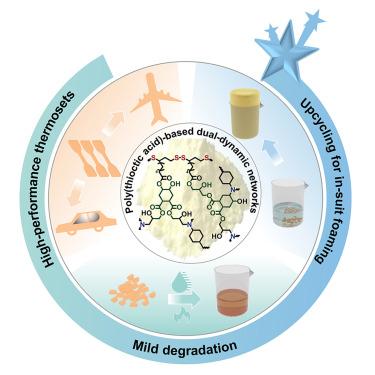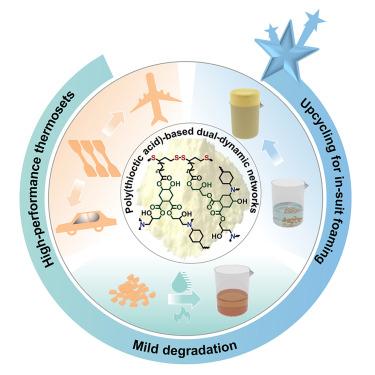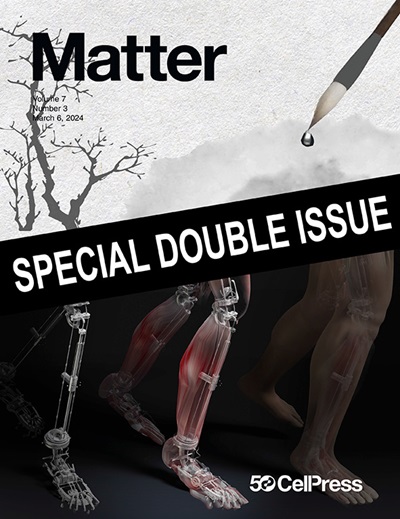High-performance poly(thioctic acid)-based thermosets featuring upcycling ability for in situ foaming enabled by dual-dynamic networks
IF 17.3
1区 材料科学
Q1 MATERIALS SCIENCE, MULTIDISCIPLINARY
引用次数: 0
Abstract
Polymers constructed from natural thioctic acid (TA) provide a solution for the development of sustainable materials. However, their inherent weak networks make them difficult to use in engineering materials featuring high durability and mechanical robustness. In this work, the autocatalytic dual-dynamic covalent adaptable networks (CANs) are devised by curing diglycidyl 4,5-epoxycyclohexane-1,2-dicarboxylate (DGEDC) with TA and bis(p-aminocyclohexyl)methane (PACM). The resulting DGEDC/TA/PACM thermosets exhibit good mechanical and thermal properties (Tg of 145°C, Td5% of 289°C, tensile strength of 70 MPa, Young’s modulus of 2.25 GPa), higher than previous poly(thioctic acid)-based materials. Due to topological network rearrangements induced by the exchange of disulfide bonds and tertiary amine-catalyzed transesterification reactions, they can be easily reshaped and repaired. Furthermore, they can be degraded mildly and upcycled into polyurethane foam by in situ foaming. This strategy of autocatalytic dual-dynamic CANs will inspire the development of practical applications of poly(thioctic acid).


基于聚(硫辛酸)的高性能热固性塑料,通过双动力网络实现原位发泡的上循环能力
由天然硫辛酸(TA)制成的聚合物为开发可持续材料提供了一种解决方案。然而,其固有的弱网络使其难以用于具有高耐久性和机械坚固性的工程材料。在这项工作中,通过将 4,5-环氧环己烷-1,2-二甲酸二缩水甘油酯(DGEDC)与 TA 和双(对氨基环己基)甲烷(PACM)固化,设计出了自催化双动力共价适应网络(CANs)。由此产生的 DGEDC/TA/PACM 热固性材料具有良好的机械性能和热性能(Tg 为 145°C,Td5% 为 289°C,拉伸强度为 70 兆帕,杨氏模量为 2.25 GPa),高于以前的聚硫辛酸基材料。由于二硫键交换和叔胺催化的酯交换反应引起的拓扑网络重排,它们可以很容易地重塑和修复。此外,它们还能被温和降解,并通过原位发泡被再生为聚氨酯泡沫。这种自催化双动力 CAN 的策略将为聚硫辛酸的实际应用开发带来启发。
本文章由计算机程序翻译,如有差异,请以英文原文为准。
求助全文
约1分钟内获得全文
求助全文
来源期刊

Matter
MATERIALS SCIENCE, MULTIDISCIPLINARY-
CiteScore
26.30
自引率
2.60%
发文量
367
期刊介绍:
Matter, a monthly journal affiliated with Cell, spans the broad field of materials science from nano to macro levels,covering fundamentals to applications. Embracing groundbreaking technologies,it includes full-length research articles,reviews, perspectives,previews, opinions, personnel stories, and general editorial content.
Matter aims to be the primary resource for researchers in academia and industry, inspiring the next generation of materials scientists.
 求助内容:
求助内容: 应助结果提醒方式:
应助结果提醒方式:


